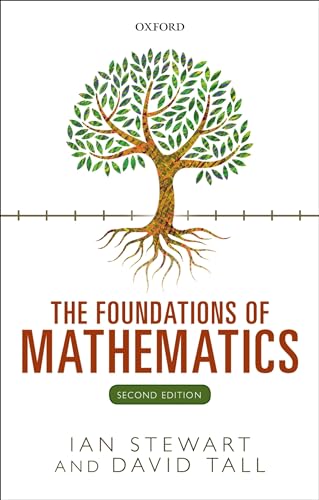Verwandte Artikel zu Foundations of Mathematics (Revised)

Inhaltsangabe
The transition from school mathematics to university mathematics is seldom straightforward. Students are faced with a disconnect between the algorithmic and informal attitude to mathematics at school, versus a new emphasis on proof, based on logic, and a more abstract development of general concepts, based on set theory.
The authors have many years' experience of the potential difficulties involved, through teaching first-year undergraduates and researching the ways in which students and mathematicians think. The book explains the motivation behind abstract foundational material based on students' experiences of school mathematics, and explicitly suggests ways students can make sense of formal ideas.
This second edition takes a significant step forward by not only making the transition from intuitive to formal methods, but also by reversing the process- using structure theorems to prove that formal systems have visual and symbolic interpretations that enhance mathematical thinking. This is exemplified by a new chapter on the theory of groups.
While the first edition extended counting to infinite cardinal numbers, the second also extends the real numbers rigorously to larger ordered fields. This links intuitive ideas in calculus to the formal epsilon-delta methods of analysis. The approach here is not the conventional one of 'nonstandard analysis', but a simpler, graphically based treatment which makes the notion of an infinitesimal natural and straightforward.
This allows a further vision of the wider world of mathematical thinking in which formal definitions and proof lead to amazing new ways of defining, proving, visualising and symbolising mathematics beyond previous expectations.
Die Inhaltsangabe kann sich auf eine andere Ausgabe dieses Titels beziehen.
Über die Autorin bzw. den Autor
Ian Stewart is Emeritus Professor of Mathematics at the University of Warwick. He remains an active research mathematician and is a Fellow of the Royal Society. Famed for his popular science writing and broadcasting, for which he is the recipient of numerous awards, his bestselling books include: Does God Play Dice?, Nature's Numbers, and Professor Stewart's Cabinet of Mathematical Curiosities. He also co-authored The Science of Discworld series with Terry Pratchett and Jack Cohen
David Tall is Emeritus Professor of Mathematical Thinking at the University of Warwick. Internationally known for his contributions to mathematics education, his most recent book is How Humans Learn to Think Mathematically (2013).
„Über diesen Titel“ kann sich auf eine andere Ausgabe dieses Titels beziehen.
- VerlagOxford University Press(UK)
- Erscheinungsdatum2015
- ISBN 10 0198706448
- ISBN 13 9780198706441
- EinbandTapa dura
- SpracheEnglisch
- Auflage2
- Anzahl der Seiten408
- Kontakt zum HerstellerNicht verfügbar
EUR 5,84 für den Versand von Vereinigtes Königreich nach Deutschland
Versandziele, Kosten & DauerNeu kaufen
Diesen Artikel anzeigenEUR 5,81 für den Versand von Vereinigtes Königreich nach Deutschland
Versandziele, Kosten & DauerSuchergebnisse für Foundations of Mathematics (Revised)
The Foundations of Mathematics
Anbieter: Better World Books Ltd, Dunfermline, Vereinigtes Königreich
Zustand: Very Good. Ships from the UK. Former library book; may include library markings. Used book that is in excellent condition. May show signs of wear or have minor defects. Artikel-Nr. 50205547-20
Anzahl: 1 verfügbar
The Foundations of Mathematics
Anbieter: Ria Christie Collections, Uxbridge, Vereinigtes Königreich
Zustand: New. In. Artikel-Nr. ria9780198706441_new
Anzahl: Mehr als 20 verfügbar
The Foundations of Mathematics
Anbieter: PBShop.store UK, Fairford, GLOS, Vereinigtes Königreich
HRD. Zustand: New. New Book. Shipped from UK. Established seller since 2000. Artikel-Nr. FU-9780198706441
Anzahl: 9 verfügbar
Foundations of Mathematics (Revised)
Anbieter: AHA-BUCH GmbH, Einbeck, Deutschland
Buch. Zustand: Neu. Neuware - The transition from school to university mathematics is seldom straightforward. Students are faced with a disconnect between the algorithmic and informal attitude to mathematics at school, versus a new emphasis on proof, based on logic, and a more abstract development of general concepts, based on set theory. This book bridges the divide. Artikel-Nr. 9780198706441
Anzahl: 2 verfügbar
The Foundations of Mathematics
Anbieter: Revaluation Books, Exeter, Vereinigtes Königreich
Hardcover. Zustand: Brand New. 2nd edition. 391 pages. 8.50x5.50x0.75 inches. In Stock. Artikel-Nr. x-0198706448
Anzahl: 2 verfügbar

